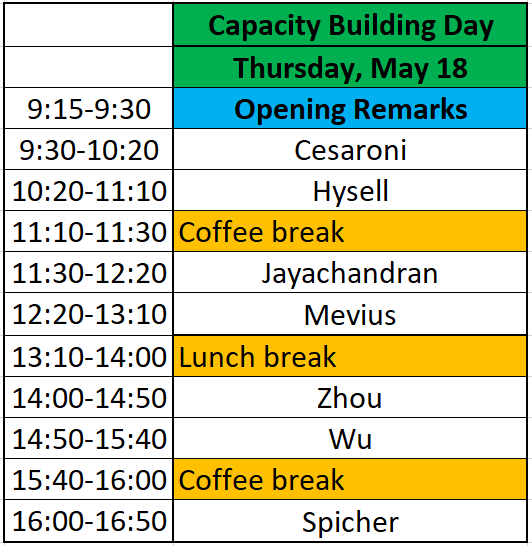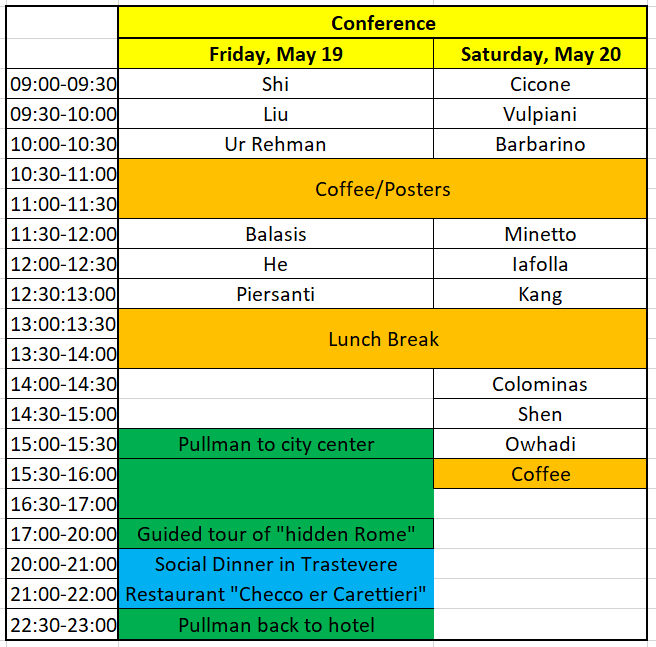Last Update on May 13
Talks Titles and Abstracts

Summer School
The Summer School wil take place from the morning of Monday, May 15, till the afternoon of Wednesday, May 17.
The tempative weekly Schedule is shown in the following.
Courses Titles and Abstracts
Course 1: Charles K. Chui and Wenjie He - "Mathematical Methods for Super-resolution Point-mass Recovery and Composite Signal Decomposition"
Two intimately related problem areas in time series and composite signal processing will be discussed in this Workshop. The first is on the super-resolution inverse problem, with focus the following top-ics:
1. Introduction of "super-resolution wavelets (SRW)" and "continuous SRW transform" for resolving the super-resolution inverse problem, by isolation of the point-masses and amplification of the co-efficients;
2. Explicit formulas for implementation of the continuous SRW transform and the corresponding search function;
3. Applications to microscopy for bio-medical research;
4. Introducing a Statistical tool for mixed probability function separation and recovery; and
5. Applications to healthcare in monitoring endocrine gland hormone secretion.
The second problem area is on "Empirical Mode Decomposition (EMD)" on the following topics:
1. Introduction of a modified sifting process for EMD on finite time-domains to avoid boundary arti-facts;
2. Linear spline EMD for fast computation and real-time Hilbert transform implementation;
3. Construction of quasi-interpolation by cubic splines with local supports;
4. Enhanced cubic spline quasi-interpolation for direct computation of mean envelopes;
5. Local cubic spline interpolation for direct computation of mean envelopes;
6. Modified global cubic spline interpolation to minimize boundary artifacts;
7. Sifting process for computing IMF without computation of stopping criteria;
8. Hilbert transform on bounded intervals without boundary singularities as a result of the modified sifting process;
9. Pre-processing options for de-noising and for singularity removal of the first IMF; and
10. Implementation details of cubic spline EMD on bounded time-domain.
Course 2: Monika Dörfler - "Signal structures: Representations, Localization, Transformation, Interpretation "
In this course, I will give an introduction to the mathematical tools involved in representing signals advantageously for certain applications. In order to so, inherent signal structures must be taken into account. We will first generally discuss the notion of structured signals and will then move on to mathematical basics of standard signal representations such as Fourier, Gabor and wavelet trans-forms. Then, adaptivity will be discussed: what is the potential, what are the pitfalls?
We will then move on to more specific and new results on sparse representations and representations used in convolutional neural networks. We will also touch on new results on analysis tools for data operators, which benefit from information about entire data sets instead of isolated data points. Final-ly, we will always give easily accessible examples from audio processing as application.
Course 3: Andrea Morelli - "Inverse problem theory and parameter fitting"
Inverse problems are a relatively common occurrence in science, that appear when we need to find parameters that best fit experimental data. In these lessons, I will mostly describe the Bayesian ap-proach to their solution, that provides a coherent and comprehensive framework where we find, as special cases, the common methods that provide convenient (and long-time popular) solutions. At the same time, I will also present very general solutions that — sometimes at a larger computational cost — may legitimately approach complex problems. I will pinpoint some common preconceptions and er-rors, that can easily be overcome, and that — although my examples will mostly be inspired by seismic tomography — can affect a wide variety of parameter fitting problems.
Summer School Temptative Schedule (CEST time)

Capacity Building day
The Capacity Building day will take place on Thursday, May 18.
Temptative Schedule (CEST time)

Conference
The Conference will take place from the morning of Friday, May 19, till the afternoon of Saturday, May 20.
Temptative Schedule (CEST time)




